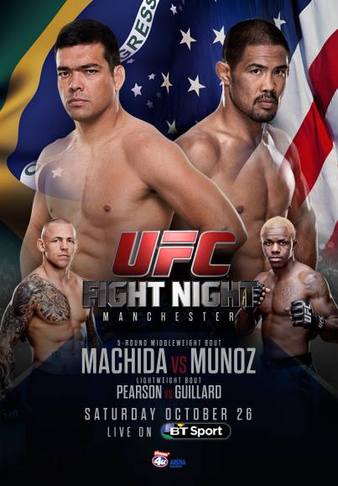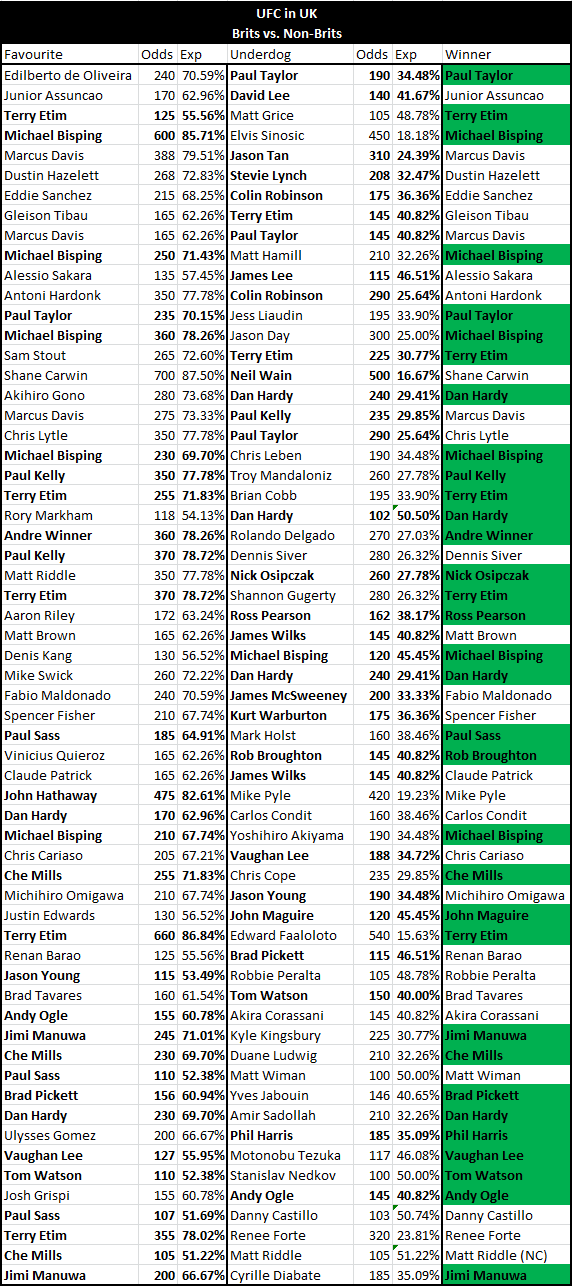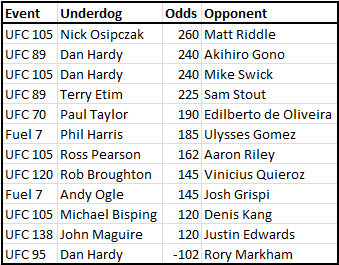 Back in 2007, when the UFC had reached the pinnacle of its popularity in the United States, the first market that the organization looked to in an effort to expand internationally was the United Kingdom (UK). This was spurred on partially by the popularity of ‘The Ultimate Fighter Season Three’ winner Michael Bisping, but also by the long and rich history of combat sports in the region. By the end of 2010 however, UFC had shifted its focus away from the UK and towards other global markets. Events were reduced to once a year, and the UK became something of an afterthought with Brazil being such a focus. Now with the Fox deal in full swing and a jam-packed schedule there seems to be a bit of a renewed commitment to the UK, as this is the first time since 2009 that the UFC has gone back twice in the same year. With the greater importance placed on the UK by the organization, it seems as good a time as any to look back at the fights which have already taken place inside the Octagon in previous visits across the pond. While it was difficult to find betting odds for the original trip to England back in 2002 (UFC 38), there were historical odds available for the rest of the trips to England, Ireland and Northern Ireland. In those 13 cards, there have been 61 bouts involving a British, Irish or Nothern Irish fighter (henceforth referred to simply as ‘Brits’ or ‘UK fighters’ for simplicity) taking on a foreigner. It was surprising to discover that Brits have gone 33-27 1 NC in those bouts. The one no contest was in the Matt Riddle-Che Mills bout, so the record could conceivably be 33-28. This figure contrasts the reputation of British fighters in the UFC as never having a great deal of success. For example, there has still yet to be a Brit who has held a UFC title, and only one time has a UK fighter even competed in a title bout (Dan Hardy at UFC 111). Through a combination of moderately favorable matchmaking and having the majority of fighters in the lower tiers of divisions, Brits have compiled a healthy record when facing fighters from the rest of the world. Let’s break down the numbers in a little bit more detail to see why exactly. The table below shows each of the 61 bouts that fit the criteria. The UK fighter and odds are in bold, while green indicates a win for that fighter.
Back in 2007, when the UFC had reached the pinnacle of its popularity in the United States, the first market that the organization looked to in an effort to expand internationally was the United Kingdom (UK). This was spurred on partially by the popularity of ‘The Ultimate Fighter Season Three’ winner Michael Bisping, but also by the long and rich history of combat sports in the region. By the end of 2010 however, UFC had shifted its focus away from the UK and towards other global markets. Events were reduced to once a year, and the UK became something of an afterthought with Brazil being such a focus. Now with the Fox deal in full swing and a jam-packed schedule there seems to be a bit of a renewed commitment to the UK, as this is the first time since 2009 that the UFC has gone back twice in the same year. With the greater importance placed on the UK by the organization, it seems as good a time as any to look back at the fights which have already taken place inside the Octagon in previous visits across the pond. While it was difficult to find betting odds for the original trip to England back in 2002 (UFC 38), there were historical odds available for the rest of the trips to England, Ireland and Northern Ireland. In those 13 cards, there have been 61 bouts involving a British, Irish or Nothern Irish fighter (henceforth referred to simply as ‘Brits’ or ‘UK fighters’ for simplicity) taking on a foreigner. It was surprising to discover that Brits have gone 33-27 1 NC in those bouts. The one no contest was in the Matt Riddle-Che Mills bout, so the record could conceivably be 33-28. This figure contrasts the reputation of British fighters in the UFC as never having a great deal of success. For example, there has still yet to be a Brit who has held a UFC title, and only one time has a UK fighter even competed in a title bout (Dan Hardy at UFC 111). Through a combination of moderately favorable matchmaking and having the majority of fighters in the lower tiers of divisions, Brits have compiled a healthy record when facing fighters from the rest of the world. Let’s break down the numbers in a little bit more detail to see why exactly. The table below shows each of the 61 bouts that fit the criteria. The UK fighter and odds are in bold, while green indicates a win for that fighter.
Looking at the table above, in those 61 fights Brits have been favored 29 times, underdogs 31 times, and one fight closed at even money. Conveniently, the even money fight was Riddle-Mills, which means that due to its result as a no contest it can be discarded from most analysis. When favored, they have been extremely successful, with a record of 21-8. Those favorites were expected to win 19.96 of those bouts, so there is a very slight overperformance there. When UK fighters were underdogs they went 12-19, but were only expected to win 11.16 fights based on closing odds. Again, a slight overperformance. Using these numbers to look at current odds for UFC Fight Night 30, where Brits are involved in nine fights against foreign fighters, it could be a bad night for the hometown fans. Currently there are only three favorites from the UK (Jimi Manuwa, Norman Parke, and Rosi Sexton) and six underdogs. Based on the odds as of this writing, they are expected to win 3.82 of the nine bouts they’re involved in. Historical winning percentages would lead us to believe that British favorites will go 2-1 (66% versus historical favorite average of 72%), and underdogs will go 2-4 (33% versus historical underdog average of 39%). That would result in four wins instead of the expected 3.82, or a 4.7% overperformance, compared to the historical 6.0% overperformance. Of course, this is all very accurate in theory, but fights don’t take place on paper or inside a calculator. One factor that needs to be taken into account when looking at these numbers is who is responsible for them. For instance, the man who was supposed to headline this card before an eye injury sidelined him – Michael Bisping – has gone 6-0 on home soil when taking on a visiting opponent. Bisping is the most successful British fighter in UFC history, and it would be foolish to expect lesser fighters to replicate his success. The same could be said for the only Brit to receive a UFC title shot, Dan Hardy. He has gone 4-1 at home, with the only loss coming to Carlos Condit. With those two fighters removed from the equation, the numbers look very different for UK fighters as a whole. Without Bisping and Hardy, the record drops to 23-26 and they actually underperform by 6.2%. As a point of comparison, it would be like looking at the performance of Canadian fighters at home but excluding GSP, who is far and away the greatest Canadian fighter of all time. That being said, the British fighters who are already included in the information compiled have been quite successful at home. Jimi Manuwa, Andy Ogle, Ross Pearson and Phil Harris have combined for a 5-1 record against visiting fighters, with three of those wins coming as underdogs. Speaking of underdogs, some of the earlier numbers pointed to a fair deal of success for UK underdogs at home, and there are a couple of big underdogs on this card (Phil Harris at +315 and Robert Whiteford at +400). Have any underdogs that big come through in the past? Listed below are the 12 British underdogs who have pulled off victories, and their lines in descending order.
After looking at those numbers, an upset for Harris or Whiteford would be unprecedented through the previous six years of history available, and their matchups look daunting to begin with. If you’re looking for two potential underdogs to plug into the earlier scenario of dogs going 2-4, Andy Ogle (+150) and Ross Pearson (+120) seem like the guys to do it, as I don’t expect Brad Scott (+220) or Luke Barnatt (+160) to find much success in their bouts. As for the favored Brits, there’s been evidence in the past that they aren’t always locks even at high numbers. The three biggest upsets of UK fighters have been +475 John Hathaway losing to Mike Pyle, +370 Paul Kelly getting his guts kicked out by Dennis Siver, and +355 Terry Etim – who had previously gone 5-1 on home soil – dropping a decision to Renee Forte. No hometown fighters are favored that highly on this card (perhaps due in part to upsets like those above), so any of the three dropping their bout shouldn’t be that much of a shocker. When all is said and done, British fighters do about as much as is expected of them, with a few notable exceptions. On UFC Fight Night 30, expectations are for approximately four wins in the nine bouts against foreign opponents. Let’s see if the numbers hold true on Saturday night.

